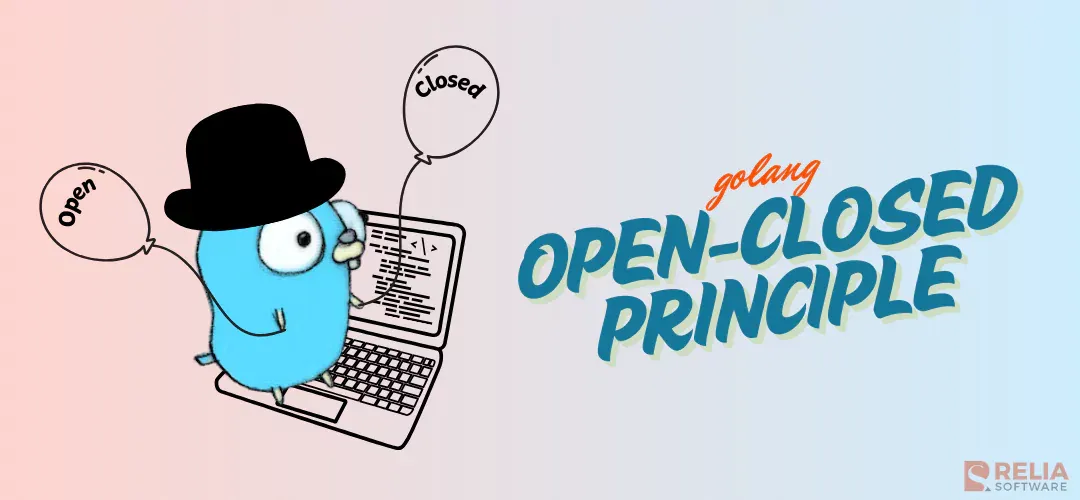In the dynamic world of software development, adaptability and longevity of code are paramount. As applications grow in complexity and scale, the need for design principles that foster extensibility and maintainability without compromising the existing system's integrity becomes increasingly critical.
One such guiding principle that has stood the test of time and continues to influence modern programming practices is the Open/Closed Principle (OCP). This principle not only encourages robust system architecture but also minimizes the risk associated with changes and additions.
This blog post delves into the Open/Closed Principle, exploring its definition, significance, and practical application in software development, particularly focusing on how it can be implemented in Go programming.
>> Read more about SOLID in Golang:
- Detailed Code Examples of Dependency Inversion in Go
- Best Practices For Dependency Inversion in Golang
- Mastering the Liskov Substitution Principle in Golang
- Mastering The Interface Segregation Principle in Golang
- Practical SOLID in Golang: Single Responsibility Principle
What is The Open/Closed Principle?
The Open/Closed Principle states that: "Software entities (classes, modules, functions, etc.) should be open for extension, but closed for modification." The Open/Closed Principle is one of the five SOLID principles of object-oriented design, introduced by Bertrand Meyer in 1988 and further popularized by Robert C. Martin.
In the context of Go, the principle can be understood as follows:
Open for Extension: This aspect of the principle implies that Go code (such as structs, interfaces, and packages) should be designed in a way that allows their behavior to be extended with new functionality as requirements evolve.
In Go, this is often achieved through the use of interfaces and composition rather than inheritance (since Go does not support traditional class-based inheritance). By programming to an interface, you can extend functionality by creating new types that implement these interfaces without altering the existing implementations.
Closed for Modification: This means that once a Go struct, module, or function is written and tested, it should not be modified each time new functionality is added.
Instead, its existing code base should remain unchanged, and any new behavior should be implemented by adding new types or functionality that work with the original code. This approach minimizes the risk of introducing bugs into already tested and functioning code.
Significance of Open/Closed Principle in Software Engineering
To illustrate the significance of OCP in software engineering, let's consider a practical example in Go, focusing on a logging system. Initially, the system might only support console logging, but with growth, there's a need to extend its capabilities to include file logging without altering the existing logging mechanism.
First, define a Logger interface:
package main
// Logger defines the interface for logging
type Logger interface {
Log(message string)
}Implement this interface for console logging:
type ConsoleLogger struct{}
func (l ConsoleLogger) Log(message string) {
fmt.Println("ConsoleLogger:", message)
}Next, to extend the system to support file logging without modifying existing code, add a new implementation.
type FileLogger struct {
FileName string
}
func (l FileLogger) Log(message string) {
// Simplified: Assume function writes message to a file
fmt.Printf("Logging to %s: %s\n", l.FileName, message)
}Finally, utilize these loggers in the application.
func main() {
loggers := []Logger{
ConsoleLogger{},
FileLogger{FileName: "app.log"},
}
for _, logger := range loggers {
logger.Log("This is a log message.")
}
}In this example, the system was extended to support file logging in addition to console logging without modifying the original ConsoleLogger implementation or the logic that uses the Logger interface.
The Open/Closed Principle (OCP) holds a significant place in the realm of software engineering, serving as a fundamental guideline for designing and developing software systems that are resilient to change, scalable, and maintainable over time.
Its core premise encourages the development of software entities that are open to extension but closed to modification, fostering a design that accommodates growth and evolution without necessitating constant reworking of existing code.
Here are some benefits when we are already applied this principle:
Facilitates Scalability
One of the paramount challenges in software development is ensuring that systems can scale to meet the evolving needs of users and technology. OCP addresses this by allowing new functionalities to be added with minimal impact on the existing codebase.
- This approach reduces the need for refactoring and overhauling systems as new requirements arise, thereby supporting scalable software development practices.
Enhances Maintainability
Software maintenance can be a daunting task, especially as systems grow in complexity. By adhering to OCP, software engineers can add new features or adjust system behavior through extension rather than modification.
- This minimizes the risk of introducing bugs into already tested and deployed code, making the system easier to maintain and reducing the total cost of ownership over the software's lifecycle.
Promotes Reusability
The principle encourages the creation of modular components that can be reused across different parts of a system or even in different projects. This modularity, achieved by designing components that are extendable without modification, leads to a more efficient development process, as reusable components can significantly reduce development time and effort.
Recognizing Open/Closed Principle Violations
When OCP is violated, it often leads to a codebase that is brittle, difficult to maintain, and resistant to change. Understanding the signs of these violations can help developers and software architects make informed decisions to refactor and improve their systems. Here are key indicators that suggest a violation of the Open/Closed Principle:
Consider a simple reporting system where a Report class generates reports in a single format. As new requirements come in, the class is modified to add more report formats, violating OCP because it's not closed for modification.
package main
import "fmt"
// Report class that violates OCP
type Report struct{}
func (r Report) GenerateReport(reportType string) {
if reportType == "CSV" {
fmt.Println("Generating CSV report")
} else if reportType == "PDF" {
fmt.Println("Generating PDF report")
} // Adding a new report type requires modifying this class
}
func main() {
report := Report{}
report.GenerateReport("CSV")
report.GenerateReport("PDF")
}In this example, every time when developer want to add a new report format. It must be modified GenerateReport method. Here are some views to make anybody can aware when someone violates this principle
Frequent Modifications to Existing Classes
One of the most telling signs of an OCP violation is the need to frequently modify existing classes or modules to add new features or functionality. If adding a new feature requires changing code that has already been tested and deployed, it's likely that the system's design does not adhere to the OCP. This can lead to increased risk of bugs and regressions, making the system less stable over time.
Extensive Use of Conditionals for Behavior Extension
A common pattern that indicates a violation of OCP is the reliance on extensive conditional statements (such as if or switch statements) to alter the behavior of a system for different scenarios.
- This approach not only makes the code harder to read and maintain but also necessitates changes to existing functions or methods whenever new conditions are added. It’s a clear sign that the system is not designed to be extended without modification.
Code Duplication
While not exclusively an indicator of OCP violations, code duplication often arises in systems where new functionalities are implemented by copying and modifying existing code rather than extending it through abstraction.
- This approach can lead to a proliferation of very similar classes or functions that differ only slightly in their behavior, which is contrary to the DRY (Don't Repeat Yourself) principle and suggests that the system is not leveraging polymorphism or interfaces effectively to achieve extensibility.
Difficulty in Adding New Features
If adding a new feature to the system requires understanding and modifying multiple parts of the codebase, it’s a sign that the system may not be properly encapsulating behavior or leveraging interfaces/abstractions for extensibility. This difficulty often indicates a design that is not open for extension, as envisioned by the OCP.
Addressing the Violation
By recognizing and addressing OCP violations, developers can improve the modularity, maintainability, and scalability of their software systems, making them more resilient to change and easier to extend with new functionalities.
To adhere to OCP, we can refactor this system by introducing an interface for report generation and implementing this interface for each report type. This way, adding a new report format doesn't require modifying existing code, only extending it.
First, define a ReportGenerator interface:
type ReportGenerator interface {
GenerateReport()
}Next, implement this interface for each report type:
type CSVReport struct{}
func (c CSVReport) GenerateReport() {
fmt.Println("Generating CSV report")
}
type PDFReport struct{}
func (p PDFReport) GenerateReport() {
fmt.Println("Generating PDF report")
}Finally, use these implementations in your application:
func generateReports(reports []ReportGenerator) {
for _, report := range reports {
report.GenerateReport()
}
}
func main() {
reports := []ReportGenerator{
CSVReport{},
PDFReport{},
}
generateReports(reports)
}In the refactored code, adding a new report type (e.g., XML) simply involves creating a new struct that implements the ReportGenerator interface, with no need to touch the existing generateReports function or the other report types:
type XMLReport struct{}
func (x XMLReport) GenerateReport() {
fmt.Println("Generating XML report")
}To include it, just add an instance of XMLReport to the reports slice in the main function:
func main() {
reports := []ReportGenerator{
CSVReport{},
PDFReport{},
XMLReport{}, // Easily add a new report type without modifying existing code
}
generateReports(reports)
}Addressing OCP violations typically involves refactoring the code to introduce more abstraction and to separate concerns more effectively. This can be achieved by:
- Using Interfaces and Abstract Classes: Define common interfaces or abstract classes that can be implemented or extended by concrete classes to add new behaviors.
- Employing Design Patterns: Many design patterns, such as Strategy, Factory, and Decorator, can help organize code in a way that facilitates extension without modification.
- Refactoring Conditional Logic: Replace extensive conditional logic with polymorphism, allowing different behaviors to be encapsulated within different classes that adhere to the same interface.
By refactoring the Report system to use interfaces, we make it open for extension but closed for modification, aligning with OCP. This approach enhances the system's maintainability, scalability, and adherence to solid software design principles.
>> Read more about Golang:
- Guide for Implementing Live Reload Using Golang Air
- A Comprehensive Guide To Dockerize A Golang Application
- What Are New Features in Golang sync.Once?
- An In-Depth Guide for Using Go sync.Map with Code Sample
- Detailed Guide for Simplifying Testing with Golang Testify
- What's New in Go 1.21 Release? Exploring 3 Handy Functions
- Instruction For Using Golang Generics With Code Examples
- Understanding Golang Ordered Map with Code Examples
- Type Conversion in Golang
- [Hands-on Guide] How to Implement Clean Architecture in Golang?
Conclusion
In conclusion, the Open/Closed Principle is not merely a theoretical ideal but a practical guideline that, when implemented effectively, can significantly elevate the quality and sustainability of software systems.
As we continue to navigate the challenges of modern software development, let the principles of OCP guide us toward creating solutions that are not just functional for today but poised for the challenges and opportunities of tomorrow.
>>> Follow and Contact Relia Software for more information!
- golang
- development

